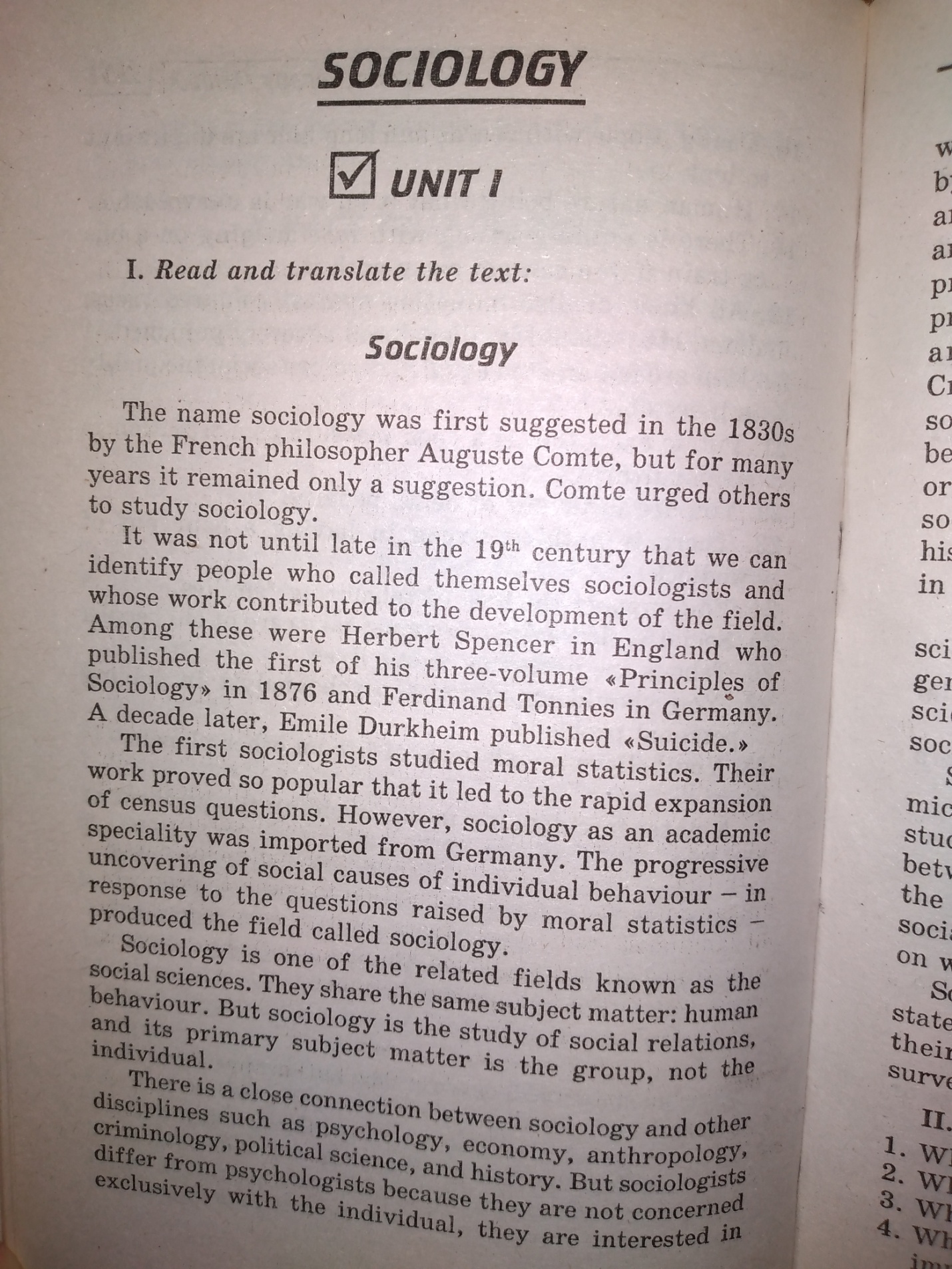Рубежный контроль 1 англ. Рубежный контроль 1 по дисциплине Иностранный язык в профессиональной деятельности
 Скачать 0.86 Mb. Скачать 0.86 Mb.
|
Рубежный контроль №1 по дисциплине «Иностранный язык в профессиональной деятельности»
Москва 2021 1. Read the text.  2. Translate from English into Russian the first two paragraphs of the text. Социология Название "социология" было впервые предложено в 1830-х годах французским философом Огюстом Контом, но в течение многих лет оно оставалось лишь предположением. Конт призывал других изучать социологию. Только в конце XIX века мы можем идентифицировать людей, которые называли себя социологами, и чья работа способствовала развитию этой области. Среди них были Герберт Спенсер в Англии, опубликовавший первый из своих трехтомных "принципов социологии" в 1876 году, и Фердинанд Тоннис в Германии. Десять лет спустя Эмиль Дюркгейм опубликовал "Самоубийство". 3. Make up a dictionary of new terms and find their russian equivalents:
4. Do ex. III, IV in the written form. Ex III. Explain the difference concerning the subject-matter between… Economics studies the production and consumption of goods and services, supply and demand, human economic behavior in general, and the use of money and capital. Sociology, in turn, seeks to develop models of economic behavior of various groups and to explore the economic forces that affect people's lives. Thus, sociology is primarily interested in the social behavior of a person in various economic actions. This special branch of sociology is called economic sociology. Sociology studies concrete actual social relations at various levels. Criminology also studies almost the same social relations of different levels, but in connection with crime. It is no coincidence that one of the synonyms of criminology for some scientists is the sociology of crime. The fundamental difference between sociology and history is that its goal is to explain what is repeated, regular, typical, and regular in the history of the main forms of social life. Ex IV. Prove by the facts that: Signs of science: - the presence of the subject of science (+), - availability of the methodology (+), - possibility of verification (checking for truth) / falsifications (according to K. Popper -the ability to refute this or that fact). (+) First, sociology is the science of society, which studies the laws of its functioning and development. Unlike history, which studies what cannot be repeated and cannot be experimentally verified, sociology mainly studies the repetitive cycles of society's activities. Secondly, sociology acts as a theory and methodology for all social sciences and humanities, thanks to the general theoretical sociology, which is one of the three levels of sociology. Third, sociology develops a technique and methodology for studying a person and his activities, methods of social measurement, etc., which are necessary and used by all other social and humanitarian sciences to obtain the most reliable information about the social phenomenon or process of interest to them. Fourth, a whole system of research is currently being conducted at the intersection of sociology with other sciences, which have been called social studies (socio-economic, socio-demographic, socio-political, etc.). The concept of macrosociology. Macrosociology studies social structures, communities, large social groups, layers, systems and processes occurring in them. The social community that is the object of macrosociological analysis is a civilization and its largest formations. The concept of microsociology.In the 30s of this century, a new branch of sociological knowledge emerged in sociology, called sociometry or microsociology. Microsociology studies the ubiquitous behavior of people in their interpersonal interactions. 5. Ask 5 questions on the text “…”. 1.Who was the first to suggest the name sociology? 2. Who were the first sociologists? 3. What were they mainly interested in? 4. What country was sociology as an academic discipline imported from? 5. What is the subject-matter of sociology? 6. Write a summary of the given text “…” in English (5-10 sentences). Summary. Sociology was first suggested in the 1830s by the French philosopher Auguste Comte. In the 19th century that we can identify people who called themselves sociologists and whose work contributed to the development of the field. The first sociologists studied moral statistics. Sociology is one of the related fields known as the social sciences. They share the same subject matter: human behaviour. But sociology is the study of social relations, and its primary subject matter is the group, not the individual. Sociology is a broader discipline than the other social sciences. In a sense, the purpose of sociologists is, in general, to find the connections that unite various social sciences into a comprehensive, integrated science of society. Sociology consists of two major fields of knowledge: micro sociology and macro sociology. Sociologists attempt to use research to discover if certain statements about social life are correct. The basic tools of their research are tests, questionnaires, interviews, surveys, and public opinion polls. |

